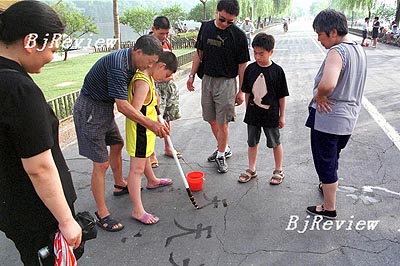
A Chinese friend of mine asked me whether I had anything planned for the weekend, and suggested I visit the Yuanmingyuan Park in Beijing to see the lotuses in bloom. Starting from the Agricultural University, we took the No.632 bus to the park. The trip took far longer than expected and I spent a full hour on the bus, so when I finally arrived at Yuanmingyuan it was already 3 p.m. The place was crowded. Everybody was taking photos of the lotus flowers planted by the entrance gate. There happens to be one of these photo shops there where you can rent a royal costume and have your picture taken. I always enjoy watching people use these props, because they look so graceful from the front but so funny from the back. Jeans and T-shirts beneath the flowing colorful royal silk. Almost like time travel in a humorous way.
I paid the 10-yuan entrance fee and started walking through the park, which was built in 1709 and has since been a venue for literature and the arts. At the park's center, I noticed an old man, who carried a boy, a long brush on a stick, and a bottle of water attached to the end of the stick. He lowered his brush onto the pavement and started drawing Chinese characters. The water bottle obviously provided the "ink" for the brush, so he was able to write on the dry stones. The wet strokes soon faded as the water evaporated. A display of how all things in life are temporary. It was like the writing on the wall in Babylon, where a magic hand appeared out of nowhere and wrote some prophecy on the wall. In the Old Testament this writing asks for the death of the tyrant Belsazar. The writing in Yuanmingyuan did not have such harsh consequences, but it attracted many people's attention, especially children.
As if knowing that for the moment he has his own magical powers, the old man takes out a number of small brushes from his bag and hands them to the children. He then carefully fills the small brushes with water and the children join in with the writing. It's a mutually joyful experience, two opposing generations happy in their brushwork, only interested in the moment.
Poems, slogans and epics appear and vanish on the pavement. Only after the old man ran out of water did he collect all his brushes and walks on. What a wonderful experience for me. This old man taught me that a teacher only needs a brush, water and a dry pavement to create literature, which will not last in books, but rather in the minds of those who have been watching the writing process. This is the true meaning of a "happening," art as a process, caught up in the moment. The beginning and end of the artwork can be observed in one demonstration. The old man had taught me a valuable lesson in the philosophy of modern art. What a successful afternoon for me, and all the children who participated. I hope everyone who visits Yuanmingyuan will come across the old man and his magic brush. It's more entertaining than reading Harry Potter and it is free of charge. Be sure to go during summer, when the flowers are blooming. Perhaps the old man needs the water lilies for inspiration to create the magical disappearing poetry beneath your feet.
|
Legend of Ma Liang
In China the idiom of the magic brush has great historical connotations, as it refers to the magic brush legend of Ma Liang. The story has fascinated Chinese children for generations. As a young boy it is said that Ma was very poor and could not afford to go to school, but loved drawing animals. One day, an old wise man presented him with a magic brush. This brush enabled Ma to bring to life whatever he painted. So he started to help everyone in his village with his magic brush, painting food and other necessities to make life more comfortable for them. Although some tried to force him to use his magic brush for gain and for evil, Ma always remained true to wisdom and justice, becoming a hero, while the magic brush became the symbol of the rich culture and ideals of the Chinese nation. |
The author is a German teacher living in Beijing |
